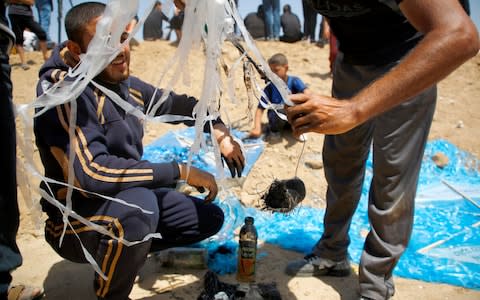Gaza's burning kites and explosives strapped to condoms raise tensions with Israel

For years Israel spared no effort to end rocket smuggling into the besieged Gaza Strip, while creating a sophisticated anti-missile system to intercept those that ended up in Hamas's hands.
But its formidable army is scrambling for a response to new Palestinian weapons that cost pennies to make: flaming kites and helium inflated condoms sent over the fortified border to torch Israeli farmlands.
Israel calls them "terror kites." Hundreds have been launched in recent months, burning thousands of acres of farmland.
The "kite war” now threatens to start a real war neither side wants. Gaza Palestinians have always been fond of kites.
A few years ago they set a record by flying more than 13,000 of them simultaneously.
There is perhaps something aspirational about the aerial toys for a people that controls neither its sea, air, nor border crossings.
Using them as flame delivery systems, however, was a byproduct of protests since March at Gaza's border in which Israeli troops killed dozens of Palestinians as some tried to breach the fence.

The protesters began constructing the simple kites in makeshift workshops. Several sticks are tied together and covered in plastic sheet.
Mesh carrying burning fuel is attached, and the kite's string is cut once the winds carry it over Israel. Others use inflated condoms and balloons carrying burning rags or Molotov cocktails.
The inflated condoms are tied together to better support their blazing freight. Israel is now installing detectors along the border to relay the coordinates of the kites, balloons and inflated condoms so a drone can intercept them before they enter Israel.
The recent flare-up comes ahead of Prince William's visit to Jordan, Israel, and the Occupied Palestinian Territories, which starts Sunday.
He will be the first royal to make an official visit to Israel and the OPT.
Hamas, the Islamist militant group that controls Gaza and which fought three devastating wars with Israel over the past decade, has encouraged the protests and says its members participate in them.

The group is conducting a delicate balancing act in which it hopes to avoid an all-out war with Israel on the one hand, while trying to force concessions on the blockade in place since Hamas kidnapped an Israeli soldier in 2006.
It is a calculation that could misfire at any moment. Israel has carried out airstrikes on Hamas targets, which along with the smaller militant group, the Palestinian Islamic Jihad, have fired mortars and rockets in two brief rounds of fighting since the marches began.
The Egyptians, who had in the past mediated ceasefires between Hamas and Israel, have made it known to the Islamists that they will not tolerate an escalation, but have decided to temporarily open their Rafah crossing with Gaza to travellers.
“What's different today is that there is no expectation on the part of Hamas that if there were a big war today that it would result in Gaza or Hamas being in a better position in terms of the blockade,” said Nathan Thrall, the International Crises Group’s Arab-Israeli project director.
Hamas “has a mutual interest with Israel. Neither side wants a war,” said Alon Eviator, a former Israeli military intelligence officer and an analyst.
“But the situation is becoming dangerous. The deterioration is increasing from week to week. There is pressure domestically in Israel for a response because there is no patience left.”

 Yahoo News
Yahoo News 
